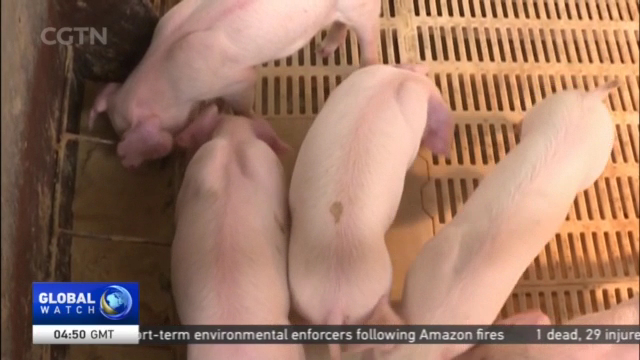
13:56, 09-Sep-2019
China's Pork Supply: African swine fever keeps pork prices rising through June
Updated
15:06, 09-Sep-2019

African swine fever has contributed to the rising prices of pigs and pork products since June. However, the stability of China's pork supply has been an issue for quite some time. CGTN's Lu Sirui talks to the expert to find out the reasons behind the fluctuation.
The average price of pork in China has kept rising since last year's outbreak of African swine fever. Especially after mid-August, sharp and high price rising has been observed. Official data from China's Ministry of Commerce says the average wholesale price of pork hit 34 yuan per kilo last week—a notable 8.9 percent increase over the previous week.
"Previously, the normal price of pork was about 7-8 yuan per half kilo. Now it's about 20 yuan. Good pork used to be 30-40 yuan, now its more than 50 yuan."
"We now buy more chicken and egg to substitute pork."
"Since the amount of pigs are declining, I think the rise in prices is reasonable."
The ministry also said it would tap the government's frozen meat reserves, including pork, beef and mutton, and push it into the market to stabilize supplies.
LU SIRUI BEIJING "African swine fever was first detected in August last year in China. It is a strong factor that caused the latest increase of pork prices. As of early July this year, around 140 outbreaks are recorded nationwide and around 1 million pigs are culled to curb the spread of the disease. However, the stability of pork supply in China has long been a problem, even before the African swine fever outbreak. So Why?"
Experts say China's pig farming has been relying on owners with small or medium scale production pig farms. Since 2007, as the rural economy develops, quite a lot of backyard-farm and small-scale farm owners quitted the industry.
A stricter raising policy has also played a role.
ZHU ZENGYONG AGRICULTURAL INFORMATION INSTITUTE OF CAAS "Since 2014, the new environmental protection policy has been strictly implemented. A lot of pig farms are closed, especially in southern China."
According to one expert, the government has been issuing supportive polices to fasten industrialization progress in the industry, in order to improve its resilience in a free market.
ZHU ZENGYONG AGRICULTURAL INFORMATION INSTITUTE OF CAAS "Over the past ten years, the government has implemented a lot of incentive programs. Many focused on improvement of infrastructure, production technology, and treatment of production waste. They have also provided subsidies for insurance for fattening pigs and breeding sow."
Experts predict the policy effect may be observed in the fourth quarter of this year, and pig production may gradually recover. Next year, it is expected the pork supply will increase and pork price will be decreased to their previous levels. Lu Sirui, CGTN, BEIJING.
SITEMAP
Copyright © 2018 CGTN. Beijing ICP prepared NO.16065310-3
Copyright © 2018 CGTN. Beijing ICP prepared NO.16065310-3